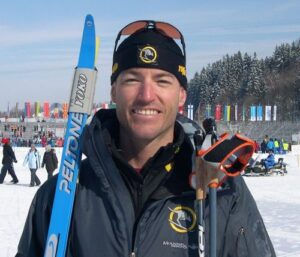Falls Creek Alpine Resort’s natural resources manager is using TERN research to balance the needs of business, safety and the environment
Ben Derrick’s job may be the envy of some snow bunnies, or the worst nightmare for the beach bums of more northern climes among us. Working in one of Australia’s least forgiving yet most stunningly beautiful environments, with an average high temperature of 1.2°C this month, it’s not unusual for Ben to have to ski to his next meeting or field survey site.
Ben is the Director of Economic Development and Land Management at Falls Creek Alpine Resort, in south-east Australia.
‘My job is fantastic. Not only is the work stimulating and rewarding, but I also get to work in an environment that I love. Being able to ski after work (and sometimes at lunchtime if I can sneak out) and on the weekends is a great added bonus,’ says Ben, who was a semi-professional cross-country skier. (He still wishes that he was!)
Victoria’s Alpine National Park is the largest and one of the most magnificent in the state, and sits at the head of the catchments of some of Australia’s major river systems. The high numbers of visitors to the park, and in particular to associated snowfields such as Mt Hotham and Falls Creek, also contribute to the region’s economy. Ensuring that this important economic and environmental resource is sustainably managed is therefore a top priority in the region.
‘We face a number of land-management challenges where we have to balance the needs of the business, safety and the environment,’ Ben says.
Local managers like Ben are in luck: six decades of scientific monitoring effort has been invested in understanding how Victorian alpine ecosystems work and how they respond to different kinds of disturbance, such as fire, grazing, development, invasive species and climate change.
The network of long-term alpine ecosystem monitoring sites, some of which were established in the 1940s and which are now supported through TERN’s Long Term Ecological Research Network, is delivering data to help underpin managers’ understanding of the dynamics of Australian alpine ecosystems.
The findings of these long-term studies are having major influence on decision-making in the establishment and ongoing sustainable management of Alpine National Park. Moreover, they are also greatly valued by local businesses such as Falls Creek Alpine Resort.
‘Having robust science on which to base our weed or fire management programs means we have much greater confidence that the effort we put in will deliver the desired outcome in an efficient way,’ says Ben.
Having a detailed knowledge of the fundamentals of ecosystem structure and function via decades of persistent ecological monitoring effort means that Ben is in a position to be able to efficiently and effectively manage the land for sustainable use.
It’s great that TERN’s environmental monitoring research is already being used to balance the needs of business, safety and the environment, but it’s also important to remember that 60 years is a short time in the alps, and there are still many things we don’t understand.
Long-term monitoring is vital for increasing our understanding, anticipating change and managing the alpine environment for sustainability.


Ben Derrick of Falls Creek Alpine Resort at the 2005 FIS Nordic World Ski Championships in Germany. Ben is tapping into six decades of scientific monitoring effort from TERN and its partners to understand how Victorian alpine ecosystems work and, importantly, how they respond to different kinds of disturbance, such as fire, grazing, development, invasive species and climate change.
Published in TERN newsletter July 2014






